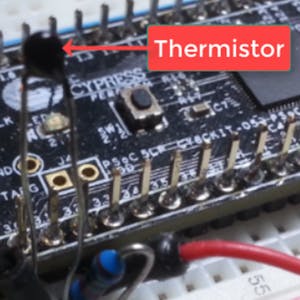Sensors and Sensor Circuit Design
This course can also be taken for academic credit as ECEA 5340, part of CU Boulder’s Master of Science in Electrical Engineering degree.After taking this course, you will be able to:
● Understand how to specify the proper thermal, flow, or rotary sensor for taking real-time process data.
● Implement thermal sensors into an embedded system in both hardware and software.
● Add the sensor and sensor interface into a microprocessor based development kit.
● Create hardware and firmware to process sensor signals and feed data to a microprocessor for further evaluation.
● Study sensor signal noise and apply proper hardware techniques to reduce it to acceptable levels.
You will need to buy the following components to do the two course projects based on the videos in this module. Note that if you have already purchased the PSOC 5LP PROTOTYPING KIT, you do not need to buy it again.
These parts may be purchased off the Digikey web site, www. Digikey.com. Or, you may obtain the specs from the site, and purchase them elsewhere.
These are the part numbers typed out, so you can copy and paste them into the Digikey web site. You will need one of each part.
428-3390-ND
NHD-0216BZ-RN-YBW-ND
570-1229-ND
A105970CT-ND
Additional equipment needed:
• Wire - various gauges and lengths
• Breadboard
• Oscilloscope – suggested models are:
o PICOSCOPE 2204A-D2 available on www.digikey.com
or
o Digilent 410-324 | OpenScope MZ available on www.newark.com
Depending on your budget, you can also investigate these models:
o Hantek HT6022BE20MHz - https://www.amazon.com/dp/B009H4AYII
o SainSmart DSO212 - https://www.amazon.com/dp/B074QBQNB7
o PoScope Mega50 USB - https://www.robotshop.com/en/poscope-mega50-usb-mso-oscilloscope.html
o ADALM2000 - https://www.digikey.com/en/products/detail/analog-devices-inc./ADALM2000/7019661
Use the core features of the Cypress PSOC development kit.
Choose the right temperature sensor, rotary sensor and amplifier for an application.
Interface sensors, LCD, and ADC to the PSOC development kit.
Syllabus
Syllabus - What you will learn from this course
Week 1
Thermal Sensors
Week 2
Sensor Development Kit and Prototyping
Week 3
Rotary and Flow Sensors
Week 4
Amplifiers and Sensor Noise
Week 5
Course Project
FAQ
When will I have access to the lectures and assignments?
Access to lectures and assignments depends on your type of enrollment. If you take a course in audit mode, you will be able to see most course materials for free. To access graded assignments and to earn a Certificate, you will need to purchase the Certificate experience, during or after your audit. If you don't see the audit option:
What will I get if I subscribe to this Specialization?
When you enroll in the course, you get access to all of the courses in the Specialization, and you earn a certificate when you complete the work. Your electronic Certificate will be added to your Accomplishments page - from there, you can print your Certificate or add it to your LinkedIn profile. If you only want to read and view the course content, you can audit the course for free.
Is financial aid available?
Yes. In select learning programs, you can apply for financial aid or a scholarship if you can’t afford the enrollment fee. If fin aid or scholarship is available for your learning program selection, you’ll find a link to apply on the description page.
Reviews
Great intro to sensors and embedded systems. Coding is simplified but that's probably good for an intro class.
It was amzing experience about how the course was so professionally held .It was amzing i have learnt different things right from practical to theory it absolutely brilliant
This course is a great overview of thermal and flow sensors and how to implement them as well as select them. It's also a great course in using the Cypress PSoC.
this coursera is very good app and both of learn project work and other in this app and all learning vedio very important and easy to learn
